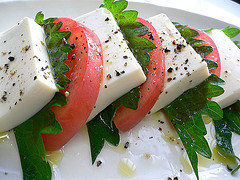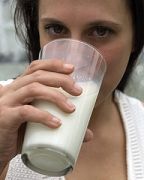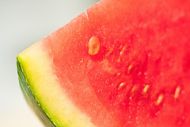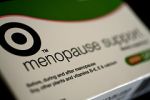Fight Menopause Blues With Food
Menopause is the end to menstruation. It is triggered by faltering and shutting down (sometimes surgical removal) of the ovaries. This can lead to hot flashes, sleep disturbances, mood swings, insomnia, fatigue, joint and muscle pain and even osteoporosis. A healthy, nutritious diet minimises the annoying symptoms. Here’s how to get it right and sail through!
The Right Foods:
 Soya And Flaxseed For Estrogen Balance: Getting through the day literally hot under the collar, or waking up sweaty at night, is not desirable. But hot flashes are inevitable. This is where soya comes in handy. Estrogen-like compounds, called phytoestrogens, found in soyabeans help to offset the drop in estrogen. These phytoestrogens act much like the female hormone. They bind the body’s estrogen receptors to supplement the effects of estrogen when levels are low. A 16-week study of 60 healthy post-menopausal women found that those who snacked on soynuts and followed the therapeutic lifestyle changes (TLC) diet or a similar diet to replace 25 grams of non-soya protein with soynuts, experienced 41-45% fewer hot flashes. (Journal Of Women’s Health, April 2007).
Soya And Flaxseed For Estrogen Balance: Getting through the day literally hot under the collar, or waking up sweaty at night, is not desirable. But hot flashes are inevitable. This is where soya comes in handy. Estrogen-like compounds, called phytoestrogens, found in soyabeans help to offset the drop in estrogen. These phytoestrogens act much like the female hormone. They bind the body’s estrogen receptors to supplement the effects of estrogen when levels are low. A 16-week study of 60 healthy post-menopausal women found that those who snacked on soynuts and followed the therapeutic lifestyle changes (TLC) diet or a similar diet to replace 25 grams of non-soya protein with soynuts, experienced 41-45% fewer hot flashes. (Journal Of Women’s Health, April 2007).
How To Get It: 450 ml of soymilk (about 2 cups) or 50g of tofu daily is all you need to dampen hot flashes. Soya, may in fact, even become a safe alternative to HRT. Sprinkle flaxseeds (another excellent source of plant estrogen) on your salads and cereals. Or get flaxseed oil (available at health and organic food stores). Other foods that contain natural estrogens are apple, barley, carrot, chickpeas, dairy foods and dates.
Dairy For Calcium:
 Women face a risk of osteoporosis during and after menopause. Those who have taken enough calcium during their life need not worry. Others need to pay attention to the calcium count.
Women face a risk of osteoporosis during and after menopause. Those who have taken enough calcium during their life need not worry. Others need to pay attention to the calcium count.
How To Get It: Drink 2-3 glasses of milk a day. Have lots of paneer and tofu. Women who are allergic to milk can get their calcium requirement from green, leafy vegetables or fish.
Serotonin To Fight The Blues:
As hormones fluctuate, so does brain chemistry, including a powerful nerve chemical called serotonin. Peri (before) and post-menopausal women who struggle with mild depression have low serotonin levels. This may see you pecking on sweets (which will add to the bulge at your waist) often, while an increase in serotonin turns off the cravings and restores a more agreeable mood.
How To Get It: Include complex carbohydrate-rich foods such as whole grains, fresh vegetables and fruits to boost serotonin levels and keep the blues away.
Potassium To Ease Water Retention:
 Lack of potassium in the body increases water retention while potassium-rich foods help maintain the balance of sodium and water in the body. Amongst the best sources for potassium are fruits.
Lack of potassium in the body increases water retention while potassium-rich foods help maintain the balance of sodium and water in the body. Amongst the best sources for potassium are fruits.
How To Get It: Choose melons, bananas and citrus fruits such as oranges and lemons. These are high in potassium. Also include dried fruits like apricots and figs.
Water For Vaginal Dryness:
Vaginal dryness and dehydration are a problem during menopause. A preventive measure is to keep yourself well hydrated.
How To Get It: Drinking at least 8 glasses of water per day for vaginal dryness is essential. Water will also help fight hot flashes.
Give These A Miss:

- Certain foods may trigger hot flashes, mood swings, vaginal discomforts and other menopausal symptoms. The culprits include sugar, caffeine, refines and spicy foods. Keep a diary where you can make notes on food intake and symptoms. This may help you to correlate foods and symptoms. Limit alcohol intake. Keep the consumption of alcohol down to one or fewer drinks per day (don’t go over 3 to 5 drinks each week). And if you smoke, it is advisable to quit the habit.
- Weight gain and menopause often go hand in hand. As estrogen levels fall in the body, fat re-distributes itself around the stomach and is lost around the hips and breasts. Muscle mass decreases, slowing metabolism. This often ends up in weight gain. To combat this, reduce foods high in fat. Fat should provide 20% or less of your total daily calories. Also, limit saturated fat (found in fatty meats, whole milk, ice cream and butter) to less than 8% of your total daily calories. Saturated fat can raise your cholesterol level and increase your risk of heart disease.
Protect Your Heart:
Remember, your risk of heart disease escalates rapidly as estrogen levels drop after menopause. Hormone replacement therapy (HRT) after thorough consultation, a healthy diet and regular exercise can significantly reduce the risk of heart disease.
 Should You Supplement:
Should You Supplement:
Most women don’t manage enough nutrients in their daily diet from food alone. Taking moderate-dose multi-vitamins and mineral supplements will help provide nutritional back-up for memory loss, mood swings, depression, irritability and osteoporosis. But you must check with your doctor.